The Mulbekh Monastery is an ancient edifice built in the 8th century AD. The structure is most famous for the 30-foot-high statue of Maitreya Buddha, which is carved on the mountain rock face. This symbolizes the future Buddha, one who is full of hope and love. It is understood that the statue must have been sculpted during the period when Buddhism began to burgeon in the region, notably due to the impact of Tibetan culture. The place also contains ancient Kharosthi inscriptions that help to contextualize the historical significance of the place.
Location
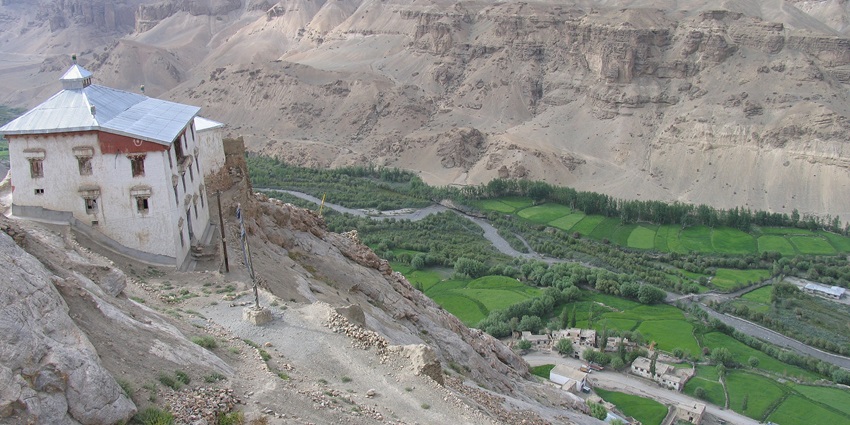
Photo: Jparande / Wikimedia Commons / Image For Representation Only
Ladakh’s Kargil district is home to Mulbekh, a tiny hamlet found on the Srinagar-Leh highway. It offers picturesque scenery and a vibrant multicultural environment. The Mulbekh monastery’s address is in Thang. The monastery contains two major gompas namely Serdung Gompa of the Drukpa sect and Rgaldan-se Gompa of the Gelugpa sect. These gompas rest on the cliff about 200 meters, which is approximately 656 feet above the road and overlooks the valley and mountains.
Suggested Read: Discover The Famous Monasteries In Ladakh
How To Reach
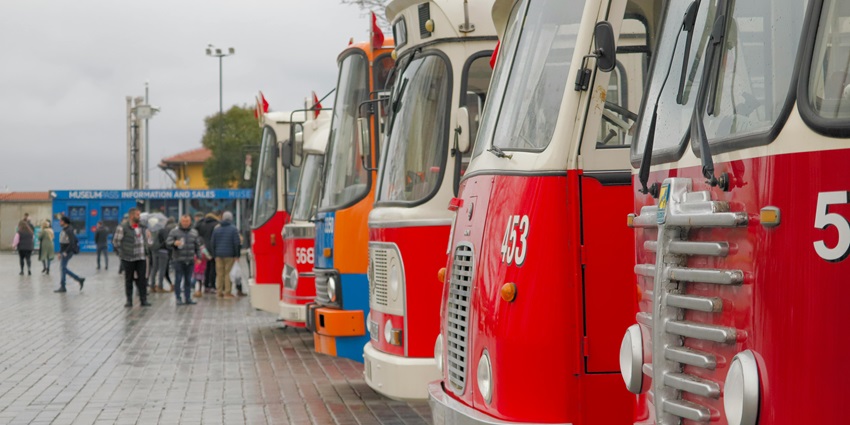
Photo: Harun R. / Wikimedia Commons / Image For Representation Only
The most common route for the visitors reaching Mulbekh Monastery, which is situated in the Kargil district of Ladakh, is either from Leh or Kargil.
By Road: The distance of the monastery from Leh is around 216 km while it is around Kargil 45 km, hence it can be reached by road. Rental cars and jeep services are available for people traveling from Leh and the cost charged is between INR 4,000 to INR 6,000 for the journey which takes 4.5 hours across the picturesque National Highway one (NH1) connecting Srinagar to Leh.
By Public Transport: Bus services are also provided by the state government and they connect both Leh and Mulbekh, thus providing cheap means of transport for the occupants. If one is coming from Kargil, then there is no dearth of local taxis and buses and the travel time is approximately 1 hour.
Places To Visit Around Mulbekh Monastery
Mulbekh Monastery is surrounded by several other attractions, further enhancing the enjoyment of the tourists.
1. Munshi Aziz Bhat Museum
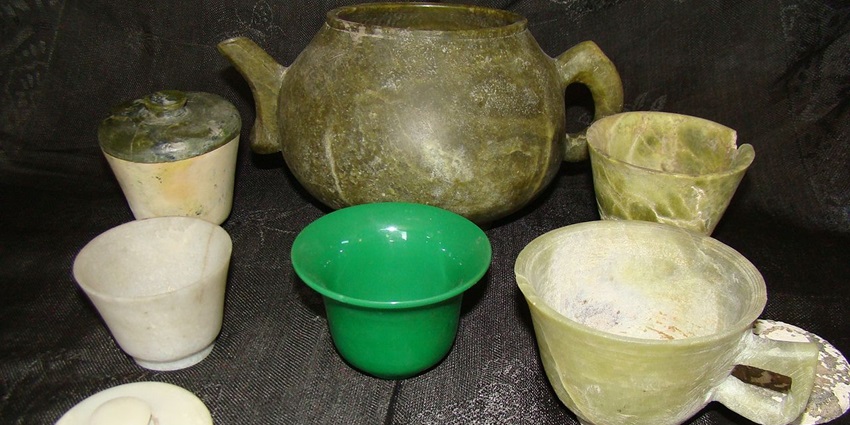
Photo: Kargilation / Wikimedia Commons / Image For Representation Only
The Munshi Aziz Bhat Museum, which is found in Kargil, Ladakh, is devoted to Munshi Aziz Bhat, a notable trader of the Silk Road. The Munshi Aziz Bhat Museum was opened in 2005 and its collections manage to represent objects dated between the 19th and very colonial trade of early Kargil. Some of the items in the collection include domestic utensils, varieties of coins and textiles, alongside a few manuscripts showing Kargil’s past presence as a trading centre.
Distance: 45 km from Mulbekh
Location: I47, Munshi Grong, Lakore, Kargil – 194193, Ladakh, India
Timings: 9 AM to 5 PM
Entry Fee: ₹50 for tourists, ₹30 for locals, and ₹10 for students
Suggested Read: Hot Springs In Ladakh
2. Dras War Memorial
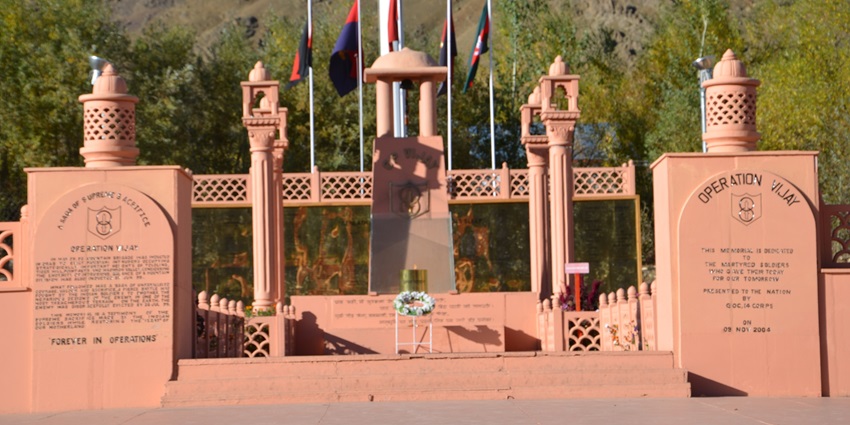
Photo: Darshancg / Wikimedia Commons
The Dras War Memorial also known as Dras Kargil War Memorial pays tribute to the Indian military personnel who lost their lives in the Kargil War of 1999 located in Dras, Ladakh. The memorial was constructed by the Indian Army and has a large pink sandstone wall that has the names of the army men who died enshrined in it. The Captain Manoj Pandey War Gallery, which includes images and other objects from the war, such as weapons that were taken by the enemy, is open to the public. To see visitors off, a tribute by Dr. Harivansh Rai Bachchan is offered, in which he praises the valour of the fighters.
Distance: 33 km from Mulbekh
Location: Near Dras town, along National Highway 1D
Timings: Open Monday to Saturday from 10 AM to 12 PM and 2 PM to 5 PM; closed on Sundays
Best Time To Visit: June to early September, avoiding harsh winter temperatures
3. Rangdum Monastery
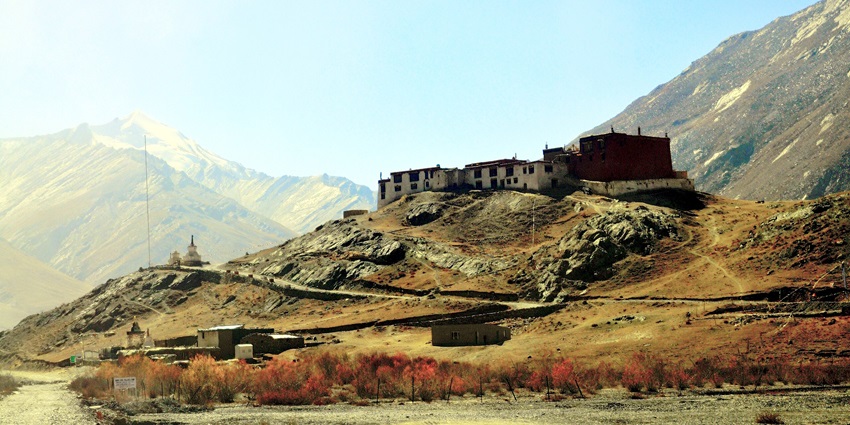
Photo: Prof Ranga Sai / Wikimedia Commons
Located in the Zanskar area of Ladakh region in India, Rangdum Monastery also known as Rangdum Gompa is one of the largest Buddhist monasteries. Established in the 18th century by Gelek Yashy Takpa, this monastery belongs to the Gelug sect of Tibetan Buddhism, to which even the present Dalai Lama belongs. Sited more than 4,030m above sea level, the monastery presents a scenic view of the regal mountains and valleys surrounding it. The monastery plays an important role in the lives of the monks and the people of the area, as it provides daily prayers for them and organizes yearly cultural celebrations in the form of fairs.
Distance: 62 km from Mulbekh
Location: Zanskar, accessible via NH1
Best Time To Visit: June to September
Suggested Read: Puga Valley In Ladakh
4. Lamayuru Monastery
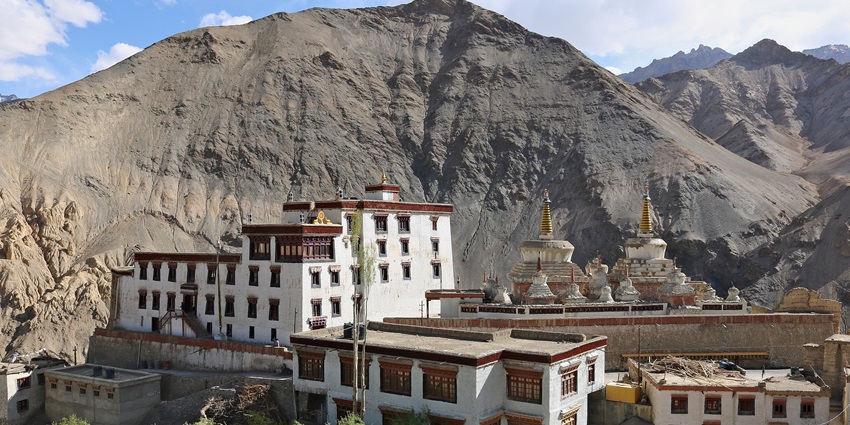
Photo: Ingo Mehling / Wikimedia Commons
The Lamayuru Monastery, located at a height of 3,510 meters is one of the oldest and largest monasteries in Ladakh. Established in the 11th century by Naropa, an Indian scholar, this monastery is well known for its beautiful architectural designs and paintings. The monastery is popularly referred to as Tharpa Ling (Place of Freedom) accommodating about 150 monks within its embrace and also contains a main assembly hall (Dukhang) covered with painted walls and a cave for meditation that Naropa used. The vision of the landscape around the monastery is no more than a barren desert, which in turn, adds to the mystery and beauty of the place. Lamayuru has two important festivals Yuru Kabyat which is held in the second month of the Tibetan calendar and Hedmos Tse Chu which takes place in the fifth month, both of which include dances performed in colorful masks.
Distance: 66 km from Mulbekh
Location: Srinagar-Leh Highway
Best Time To Visit: April to June
Timings: 7 AM to 7 PM
5. Suru Valley
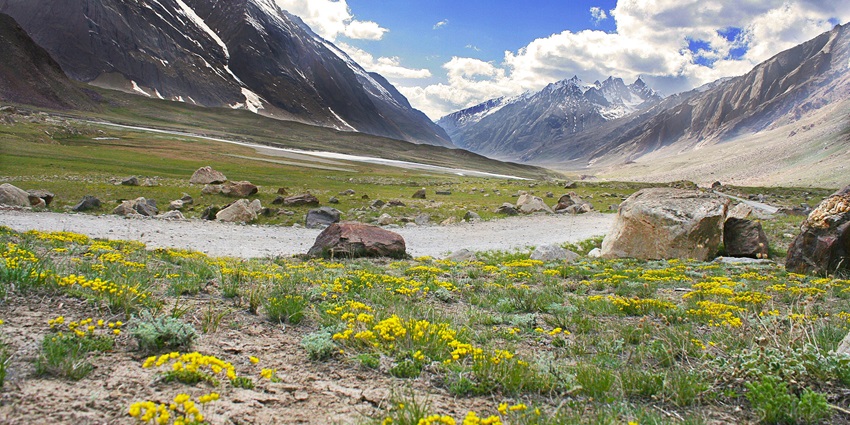
Photo: Narender9 / Wikimedia Commons
The Suru Valley is situated in the Kargil district of Ladakh and is widely appreciated for its breathtaking beauty along with the culture of the people inhabiting the region. The valley, which stands at an elevation of around 3000 meters above sea level, derives its name from the Suru River, which is an Indus River tributary. Visitors can take a tour around pleasant Villages like Sankoo and Kartse Khar where a 7-foot tall statue of Buddha is present. The region has fertile land and is engaged in the cultivation of crops, with an emphasis on the growing of barley.
Distance: 53 km from Mulbekh
Location: Accessible from Kargil town
Best Time To Visit: June to September
Suggested Read: Adventure Sports In Ladakh
Where To Stay
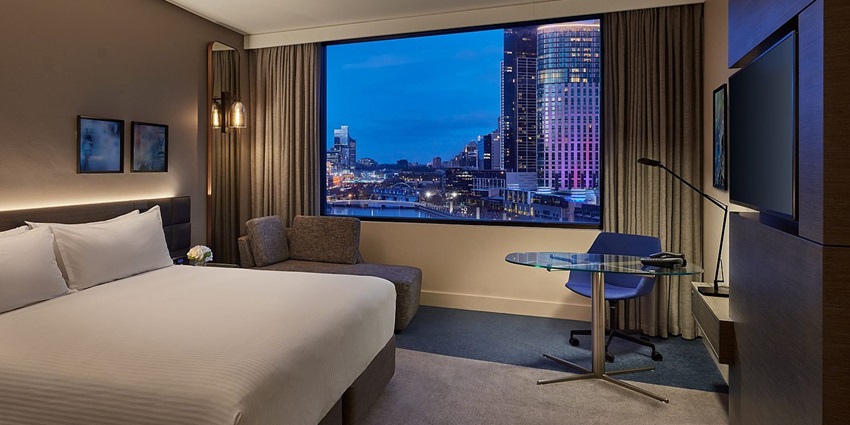
Photo: IHG / Wikimedia Commons / Image For Representation Only
After paying homage at the Mulbekh Monastery, one has several accommodation facilities to choose from. Black Sheep Bed and Breakfast is a warm and welcoming place with a local feel. The Royal Kargil on the other hand offers more upscale services. Ashina Eco Resort is perfect for eco-friendly guests as it does not only provide comfort but resorts to sustainable practices as well. Apart from that, there are also homestays in the region that enable the guests to appreciate the Ladakhi culture. Such options have been designed in consideration of the different budgets and tastes of the people.
Where To Eat
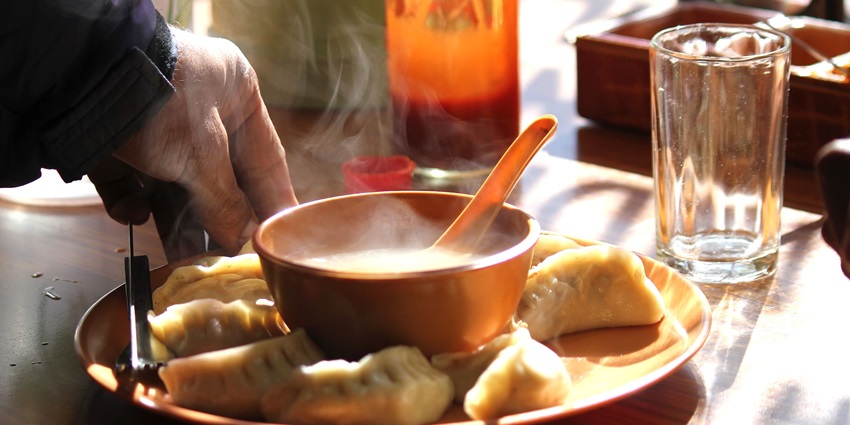
Photo: IHG / Wikimedia Commons / Image For Representation Only
In the proximity of the Mulbekh Monastery, tourists can also relish the traditional food in some of the local restaurants. Some favorite foods are Thukpa which is a noodle soup, Momos which are dumplings, and Butter tea whose ingredients at times include yak cheese and barley grown locally. The meal setting is provided in the village households, where diners can enjoy home-cooked dishes within a family setup. On the other hand, Kargil has various restaurants like Café Bikes, Bullets & Barrels, Cafe-de-Riverside that comprise both local and continental cuisines. Such alternatives help to fill the tummy, as well help one appreciate the food culture of the Ladakh region, making it enjoyable.
Suggested Read: Best Food In Leh
Best Time To Visit
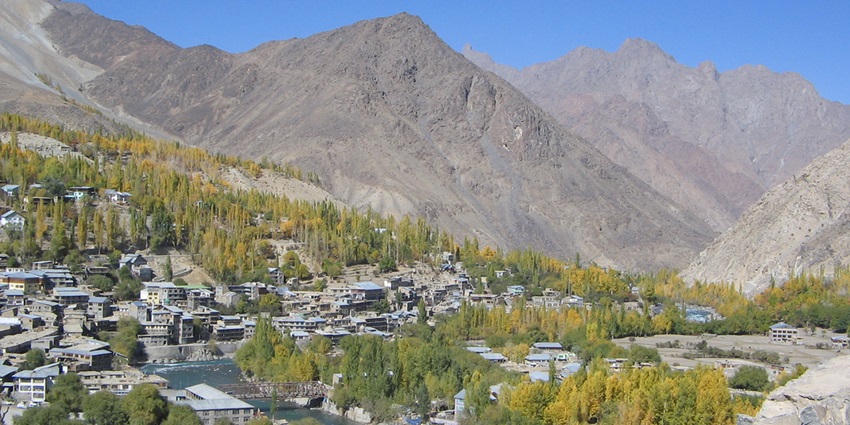
Photo: Saurabh Lall / Wikimedia Commons
The Mulbekh monastery timings are from 8 AM to 6 PM. The perfect season for a visit to Mulbekh Monastery is during the summer months, in particular, the period of June to September. This season is characterized by good climatic conditions, that is, no rains with moderate temperatures, making it suitable for tourism activities. The journey is made easier in these months, as the well-maintained roads are snow-free. Tourists will enjoy amazing views of the Himalayan range and also the culture, including some local activities such as festivals held. For a less crowded experience, late spring (May) or early fall (October) can also be preferred, although weather conditions could be a bit chilly.
Other Factors To Consider
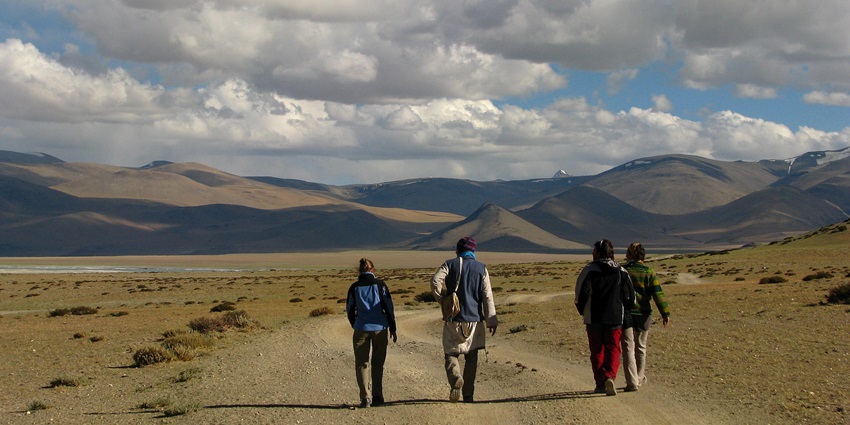
Photo: McKay Savage / Wikimedia Commons
Here are some factors to consider while you plan your trip to Mulbekh Monastery.
Average Cost Of Trip
The average daily budget for visiting Mulbekh Monastery is influenced by the travel options undertaken by the traveller.
- Transportation: A taxicab from Leh approximately costs around ₹4000- ₹6000 for a round trip (216km). Or there are state buses for about ₹500- ₹1000.
- Accommodation: Kargil located nearby has guest houses and hotels charging between ₹1000- ₹3000 for accommodation per night.
- Meals: One can estimate between ₹500- ₹1000 per day for food, with local fast food joints serving local Ladakhi food.
To sum it all up, it would be reasonable to set aside a day budget per person of about ₹2500- ₹5000 for a moderate tour, covering all the basic transportation, lodging, meals and other incidentals.
Tips For Travellers
- Dress Appropriately: As it is a religious site, act with restraint and dress in a manner that does not expose the shoulders and knees.
- Acclimatization: Take a day or two in Leh to adjust to the height of (11,495 feet) before proceeding to the Monastery.
- Stay Hydrated: Dehydration is possible because the weather is very arid, therefore water has to be carried along and drunk.
Suggested Read: Trekking In Ladakh Zanskar
The Mulbekh Monastery is an example of the culture and spirituality of Ladakh. It is surrounded by magnificent mountains, historic structures and warm-hearted people, making it a completely engaging experience for those wanting adventure as well as peace. Plan your trip with TripXL and get ready for an amazing endeavour in this beautiful piece of art called ‘Mulbekh Monastery.
Cover Photo: Ashishyadav.photographs / Wikimedia Commons


 WhatsApp
WhatsApp
 Twitter
Twitter









